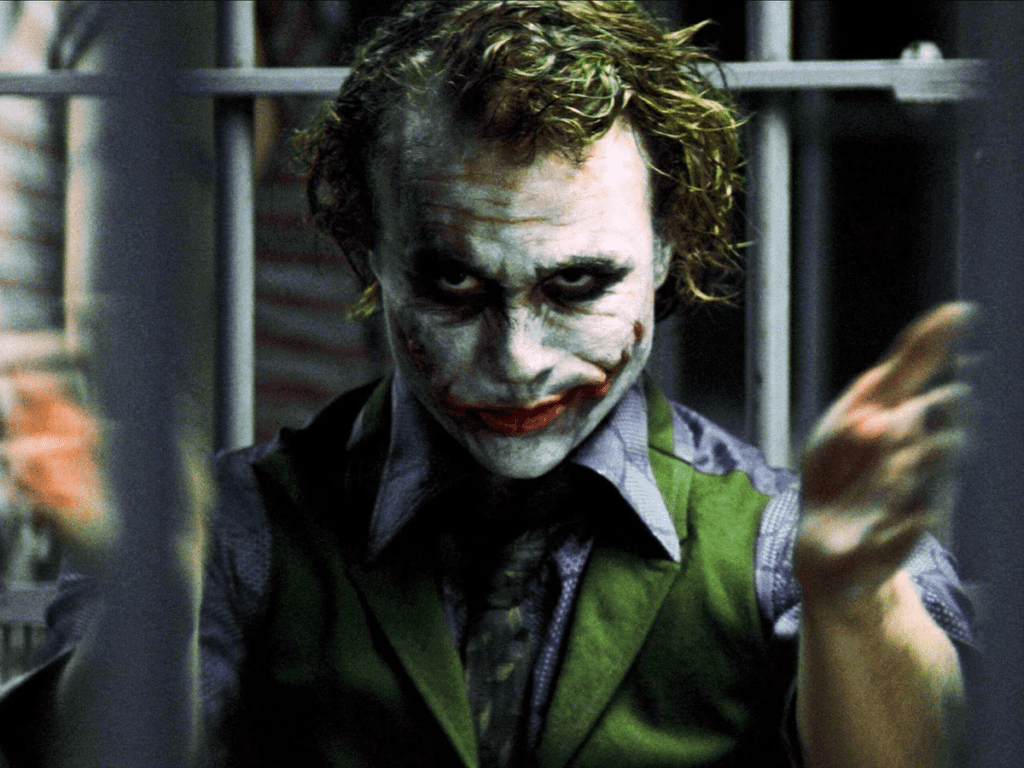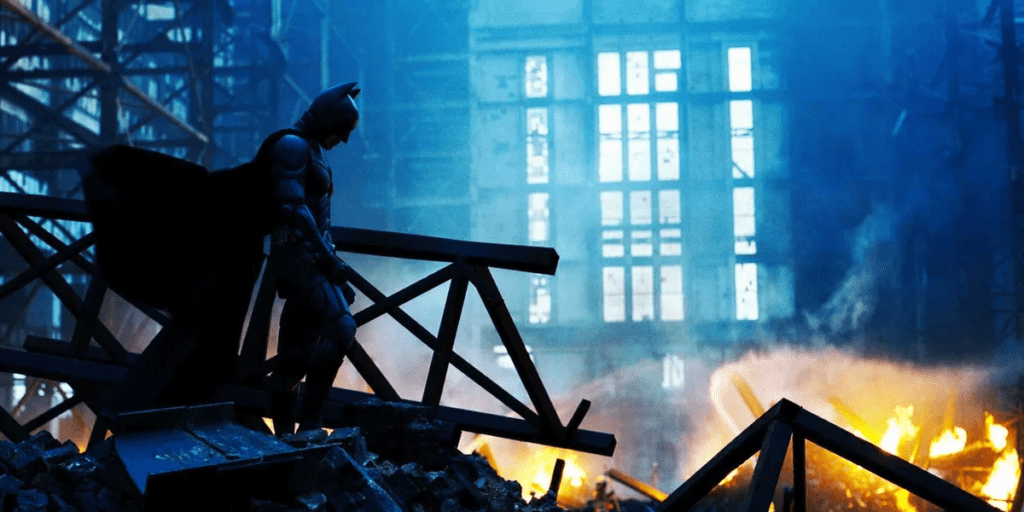When it comes to comic book adaptations, few films have left as profound an impact as Christopher Nolan’s The Dark Knight (2008). It’s not just a film about Batman; it’s a deep dive into the complexities of morality, chaos, and justice. Nearly two decades later, it’s still regarded as one of the greatest films ever made. This film isn’t just a regular superhero film; it’s a brilliantly crafted narrative that weaves together compelling characters, sophisticated themes, and unforgettable performances landing it the second place spot on our list of Christopher Nolan’s Filmography Ranked, just behind Interstellar and just ahead of The Prestige. Here’s why The Dark Knight remains a cinematic masterpiece.

A Story Beyond Superheroes
At its core, The Dark Knight is about the battle between order and chaos, and how both concepts can manifest in the real world. While the film centers around Batman’s (Christian Bale) efforts to stop the Joker (Heath Ledger), it’s more about the philosophical underpinnings of their clash. The Joker isn’t simply a villain with a plan; he’s an agent of chaos, challenging the very nature of Gotham’s justice system. Batman, in his quest to restore order, questions his own role in the city’s dark underbelly. The film asks tough questions: What does justice look like when the rules can be bent? How far are we willing to go to achieve peace? These deep philosophical inquiries elevate the story far beyond typical superhero fare.
The Unforgettable Joker Performance
When it comes to the Joker, Heath Ledger’s portrayal is nothing short of legendary. He doesn’t just play the character; he becomes the character. The Joker in The Dark Knight is pure unpredictability and malice, yet his madness feels terrifyingly logical. Ledger’s performance is chilling, humorous, and deeply human all at once. He completely redefines the role, providing a stark contrast to previous portrayals. His Joker is unhinged, but he’s not just a psychopath—he’s a philosopher, challenging the very fabric of society. Ledger’s commitment to the role, his haunting voice, and his manic energy made this portrayal iconic. Tragically, Ledger passed away before the film’s release, but his performance continues to be remembered as one of the best in film history.

Complex Characters and Moral Dilemmas
One of The Dark Knight’s greatest achievements is how it treats its characters with depth and complexity. Batman, as portrayed by Christian Bale, is a flawed hero struggling with his dual identity. He’s torn between the need for justice and the desire to protect the citizens of Gotham, often at the expense of his own morality. Then there’s Harvey Dent (Aaron Eckhart), the district attorney who begins as Gotham’s shining white knight but transforms into the vengeful villain Two-Face after a tragic turn of events. These are characters who evolve over the course of the film, and their internal struggles mirror the chaos unfolding around them. The emotional stakes are high, making the audience care deeply about the choices these characters make.
The film’s treatment of moral ambiguity is one of its most striking aspects. Batman’s decisions in the final act force him to choose between his ideals and the greater good. The Joker constantly tests Gotham’s sense of right and wrong. Is the line between good and evil truly that clear? The Dark Knight doesn’t just provide answers—it makes you think.
The Stunning Cinematography and Direction
Visually, The Dark Knight is a work of art. Christopher Nolan, known for his mastery of practical effects and minimal reliance on CGI, elevates the film to a new level of realism. From the sweeping aerial shots of Gotham to the intense action sequences, every frame feels purposeful and carefully crafted. The use of IMAX cameras for select scenes, like the iconic opening bank heist, adds a layer of immersion that puts the audience directly into the action.
Nolan’s direction is meticulous, balancing the intricate plotting of the story with moments of breathtaking spectacle. The tense, atmospheric cinematography by Wally Pfister adds a somber tone to the film, highlighting Gotham’s grim reality. The film’s pacing also stands out; it’s a thrilling ride that keeps the audience on the edge of their seats, yet it’s never rushed.

A Haunting, Iconic Score
The score by Hans Zimmer and James Newton Howard adds another layer of brilliance to The Dark Knight. The music isn’t just an accompaniment; it’s a vital part of the storytelling. From the subtle, ominous tones that accompany the Joker’s entrance to the pulse-pounding intensity of the action sequences, the score enhances every moment of the film. The Joker’s theme, in particular, is a standout—a discordant, creeping sound that mirrors the character’s insanity. The score isn’t just heard; it’s felt, amplifying the film’s emotional and psychological stakes.
Cultural Impact and Legacy
The Dark Knight did more than redefine the superhero genre; it changed the way we think about blockbuster filmmaking. It proved that comic book films could be just as serious, intelligent, and thought-provoking as any other genre. It opened the door for a new wave of films that sought to blend spectacle with substance. The film’s influence can be seen in everything from subsequent superhero films to other genres embracing more complex, morally grey narratives. Its impact on pop culture is immeasurable, and it has spawned countless discussions, analyses, and debates.
Conclusion: A Masterpiece of Modern Cinema
In the end, The Dark Knight is not just a superhero film—it’s a masterclass in storytelling, performance, and filmmaking. It challenges expectations, defies genres, and leaves audiences with something to ponder long after the credits roll. Its exploration of morality, chaos, and justice has made it a timeless classic, and Heath Ledger’s portrayal of the Joker is, without a doubt, one of the most memorable performances in cinematic history. If you haven’t watched The Dark Knight yet, do yourself a favor and experience one of the greatest films ever made.
Pingback: Interstellar Film Review - A Deep Dive - Collector's Caves
Good https://is.gd/N1ikS2
https://shorturl.fm/N6nl1
https://shorturl.fm/m8ueY
https://shorturl.fm/m8ueY
https://shorturl.fm/XIZGD
https://shorturl.fm/a0B2m
https://shorturl.fm/N6nl1
https://shorturl.fm/68Y8V
https://shorturl.fm/m8ueY
https://shorturl.fm/N6nl1
https://shorturl.fm/68Y8V
https://shorturl.fm/m8ueY
https://shorturl.fm/9fnIC
https://shorturl.fm/9fnIC
https://shorturl.fm/TbTre
https://shorturl.fm/9fnIC
https://shorturl.fm/TbTre
https://shorturl.fm/6539m
https://shorturl.fm/IPXDm
https://shorturl.fm/0EtO1
https://shorturl.fm/YZRz9
https://shorturl.fm/LdPUr
https://shorturl.fm/Xect5
https://shorturl.fm/I3T8M
https://shorturl.fm/xlGWd